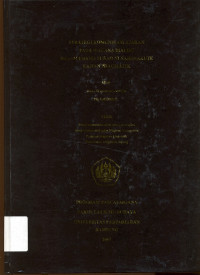
Text
EFEKTIVITAS POSITIVE COGNITIVE BEHAVIORAL THERAPY UNTUK MENINGKATKAN SELF-ACCEPTANCE PADA ISTRI YANG TERTULAR HIV OLEH SUAMINYA
A wife who is infected with HIV by her husband has low self-acceptance
and more psychological problems than other People Living With HIV / ...
-
Code CallNo Lokasi Ketersediaan 010030008313 150 Pan e Perpustakaan Pusat (Reference Kls. 100 REF.19.1.16) Tersedia -
Perpustakaan Judul Seri -No. Panggil 150 Pan e/R.19.1.16Penerbit Fakultas Psikologi UNPAD : Jatinangor., 2018 Deskripsi Fisik xiv, 209 hlm. ; ill. ; 29,5 cmBahasa IndonesiaISBN/ISSN -Klasifikasi 150Tipe Isi -Tipe Media -Tipe Pembawa -Edisi -Subyek Info Detil Spesifik ReferencePernyataan Tanggungjawab Pandu Satriajati -
A wife who is infected with HIV by her husband has low self-acceptance
and more psychological problems than other People Living With HIV / AIDS
(PL WHA) resulting in many disadvantages to her. Therefore, psychological
interventions need to be given to improve her self-acceptance. Positive Cognitive
Behavioral Therapy is considered as the right therapy because it is able to change
her perspective, behavior, and her feelings to be more positive and support the
improvement of her self-acceptance. However, Positive Cognitive Behavioral
Therapy is a new therapy and its effectiveness is still needs to be examined, so the
purpose of this study is to examine the effectiveness of Positive Cognitive
Behavioral Therapy in improving self-acceptance on a wife who is infected with
HIV by their husband.
The research design used in this research was mixed methods: concurrent
nested embedded design. Subjects in this research were 4 wives, aged 21-38 years
who was infected with HIV by their husbands and obtained by Purposive Sampling.
Positive Cognitive Behavioral Therapy used in this study was developed by
Bannink (2012) and six sessions was given to the subject. The subject self
acceptance level was obtained by using an unconditional self-acceptance
questionnaire developed based on unconditional self-acceptance principles
according to Ellis (1997), interviews, and observation sheets.
The results showed that Positive Cognitive Behavioral Therapy effectively
improve self-acceptance of a wife who is infected with HIV by her husband.
Changes were seen from the increase of total and per dimension score of all four
subjects' self-acceptance after doing Positive Cognitive Behavioral Therapy. The
results of interview and observation also showed improvement of their self
acceptance after doing Positive Cognitive Behavioral Therapy. Changes occured
because subjects had increased their understanding of self-acceptance dimensions,
had more positive emotional and behaviors that favor self-acceptance
improvements that help subjects to accept their current state and status. -
Tidak tersedia versi lain
-
Silakan login dahulu untuk melihat atau memberi komentar.






